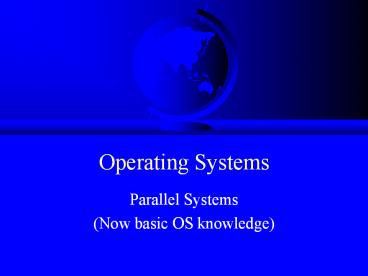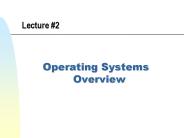Operating Systems - PowerPoint PPT Presentation
Title:
Operating Systems
Description:
Operating Systems Parallel Systems (Now ... Inefficient scheduling ... Designed from start Windows NT/2000 Mach Unix AT&T System V Sun Solaris HP Unix OSF Unix IBM ... – PowerPoint PPT presentation
Number of Views:132
Avg rating:3.0/5.0
Title: Operating Systems
1
Operating Systems
- Parallel Systems
- (Now basic OS knowledge)
2
Parallelism
- Multiple processes concurrently
CPU1
CPU1
CPU1
Process 1
Pseudo- Parallelism
CPU1
CPU1
CPU1
Process 2
CPU1
Process 1
True Parallelism
CPU2
Process 2
3
Parallel Hardware
Registers
Registers
CPU1
CPU2
Disk Controller
Memory
Disk
- Symmetric Multi-Processors
- Increasingly common.
- How to modify OS to handle new hardware?
4
Two Operating Systems
- Divide memory in two
- Run an independent OS in each
- Each has its own processes
- Drawbacks
- Twice as much memory used for OS
- IPC tough
- Who controls memory and disk? (convenient)
- Inefficient scheduling (efficient)
5
Sharing the Operating System
Main Memory
OS Code
Race Conditions!
Shared? stack process table current
process device queues
6
SOS Multi-Processor Support
- In StartUsingProcessTable()
- What is the exchangeword mechanism similar too?
- We busy wait. Is this ok? Why or why not?
- In FinishUsingProcessTable()
- We dont protect setting the Flag. Is this ok?
Why or why not? - In SelectProcessTable()
- Why do we have the variable return_value?
- What other parts of the OS would need protection?
7
Example Multiprocessor OSes
- Almost all new OSes!
- Designed from start
- Windows NT/2000
- Mach
- Unix
- ATT System V
- Sun Solaris
- HP Unix
- OSF Unix
- IBM AIX
- SGI Irix
- Linux
8
Threads
- Software Multi-Processors
9
Threads (Lightweight Processes)
- Basic unit of CPU utilization
- (What?! you say)
- Own
- program counter
- register set
- stack space
- Shares
- code section
- data section
- OS resources
Process
Program Counter (Threads)
A
B
C
text segment
A
B
C
data segment
Multithreaded Program
10
Stack
- A(int tmp)
- B()
- printf(tmp)
- B()
- C()
- C()
- A(2)
11
Example A Threaded Spreadsheet
Display Thread
Spreadsheet Data
Other Data
Command Thread
12
What Kinds of Programs to Thread?
- Independent tasks
- ex debugger needs GUI, program, perf monitor
- especially when blocking for I/O!
- Single program, concurrent operation
- Servers
- ex file server, Web server
- OS kernels
- concurrent system requests by multiple users
13
Thread Benefits
- What about just using multiple processes with
shared memory? - fine
- debugging tougher (more thread tools)
- processes slower
- 30 times slower to create on Solaris
- slower to destroy
- slower to context switch among
- processes eat up memory
- few thousand processes not ok
- few thousand threads ok
14
Threads Standards
- POSIX (Pthreads)
- Common API
- Almost all Unixs have thread library
- Win32 and OS/2
- very different from POSIX, tough to port
- commercial POSIX libraries for Win32
- OS/2 has POSIX option
- Solaris
- started before POSIX standard
- likely to be same as POSIX
15
SOS Thread Implementation
- Why doesnt the Process have a state anymore?
- Does a process have to have threads?
- What new system calls might be useful for support
of threads? - What new sheduling criteria might the Dispatcher
use when scheduling threads?
16
Levels of Threads
User Level Thread
Process A
Process B
Thread
Kernel Thread
17
Do they Work?
- Operating systems
- Mach, Windows NT, Windows 95, Solaris, IRIX, AIX,
OS/2, OSF/1 - Millions of (unforgiving) users
- NFS, SPEC
Speedup
1 4 8 12 16 20 24 CPUs































